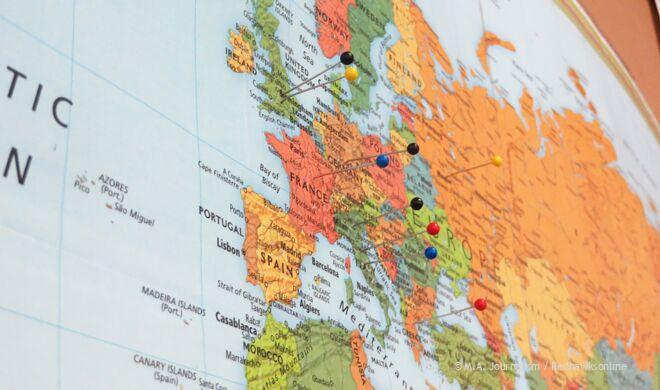“In the first hour of my history class, I was just amazed that the things that I perceived as being known worldwide, [many students didn’t know],” exclaimed Junior MatuÌsÌŒ KocÌŒalka who is a foreign exchange student from Slovakia. “I know [it’s different] for people who are younger or older, but at the same time [these global issues] are written everywhere and many people [in my class] didn’t know about the Greek crisis or what was happening in Ukraine.”
KocÌŒalka’s experience is an example of a common realization that, as the world has progressed into the 21st century, information, travel and cultural diversity have all become more accessible to us through new technology and scientific advances. Yet, America and its citizens still linger in the past with an isolationist approach to global influences and issues, says a study conducted in 2009 by the European Journal of Communication where citizens of Denmark, Britain, Finland, and the United States were asked to answer questions concerning global affairs.
“The Europeans clobbered us,” said Andrew Romano in his report, published in Newsweek. “68 percent of Danes, 75 percent of Brits, and 76 percent of Finns could, for example, identify the Taliban, but only 58 percent of Americans managed to do the same-even though we’ve led the charge in Afghanistan.”
These statistics reflect many recent studies that show America lagging behind in global awareness which, according to world history teacher Nathan Johnson, is a direct result of our country’s history.
“[Global connections] are something Americans should understand because 98 percent of us have come from places around the world,” said Johnson. “Historically, if we go back to the founders of our country and all through the 1800’s, the leaders of our country just wanted to stay out of global affairs, and we’re separated by two oceans so we thought we could ignore what was happening around the world.”
However, according to Sanford Ungar, former president of Goucher College where every student studies abroad to encourage diversity and global awareness, Johnson’s explanation of the historical impact on our global awareness isn’t the only reason we aren’t as informed.
“This condition reflects the basic inadequacy of the educational system at every level, when it comes to understanding the world we live in,” wrote Ungar in his paper, “American Ignorance.” “Americans of all ages have long scored lower than citizens of other countries on geography and current-events awareness quizzes and shown an inability even to locate major countries on the map, let alone develop an appreciation for their cultures or their roles in global affairs.”
Ungar argues that a lack of importance placed on global studies is what hinders our development of compassion and appreciation for other cultures and encourages Americans to become more apathetic towards international affairs.
“If our call is to love people how can I do that if I don’t know they exist or what they’re going through?” asked Johnson. “I’m impacted all the time by what is happening in other places, so I can better understand what is happening in my life and my country if I understand the world.”
Ungar believes that this understanding can only be achieved by making this issue the first priority for our nation. “This will require nothing less than a national call to action,” said Ungar. “We are not dealing with a partisan issue, and the concern is relevant for all economic strata and all social groupings in the United States.”
Johnson argues that making a habit of reading international news or striving to seek out people from other cultures is one of the best ways to stay globally aware and informed.
“If you feel like you’re not informed about the world, you might have to change your habits to some extent because it doesn’t happen naturally,” said Johnson. “Our newspapers generally talk about local stuff and what happens on social media is really primarily about American events. So, if you want to be informed about what happens in other places, you have to be intentional about making a habit of seeking out sources that will open your eyes up to other things.” Johnson says striving to be an educated and involved global citizen is something everyone should strive for and encourage others to be as well.
“The most important part is to care about others,” KocÌŒalka said. “If you do not pay attention to what’s happening in the world, then you can’t care about others because you don›t know how to care and where to put your efforts and where to participate. If people knew what’s happening around them, it would all be connected and these global events seem far away, they are happening right here.”

